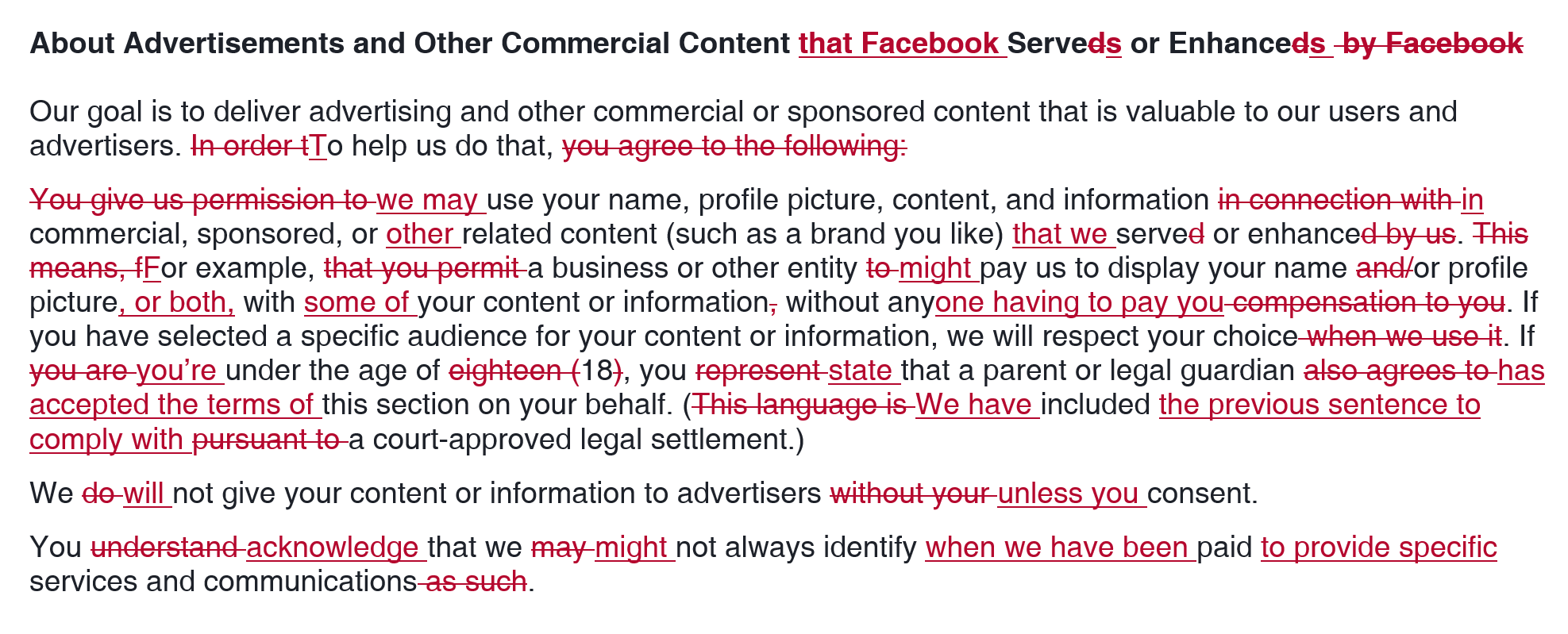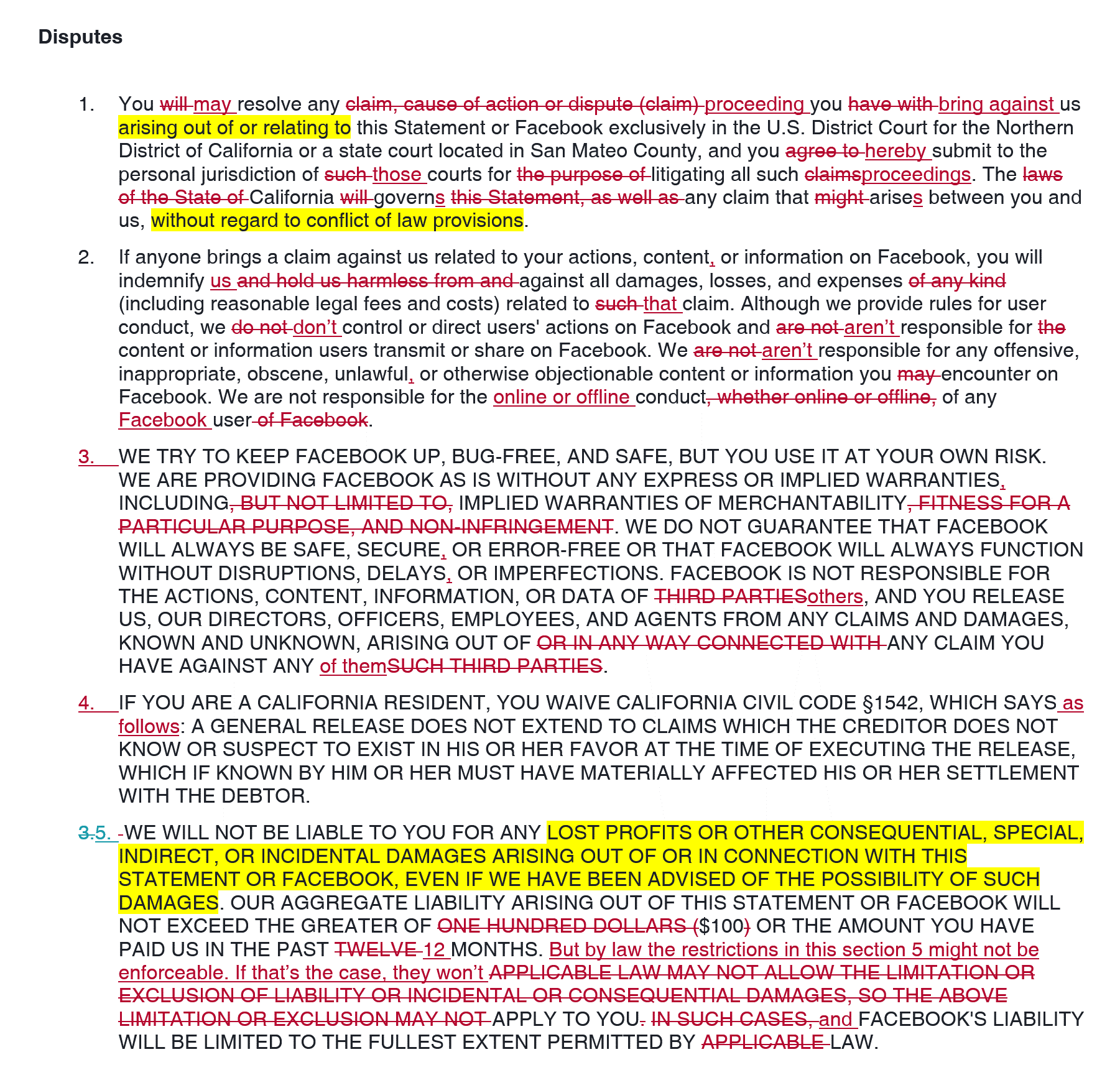Behold the following video clip of U.S. Senator John Neely Kennedy giving Mark Zuckerberg of Facebook a piece of his mind:
https://www.youtube.com/watch?v=bBevsgSn65A
More specifically, he says, “Your user agreement sucks. … I’m going to suggest to you that you go back home and rewrite it. And tell your $1,200-an-hour lawyers—no disrespect, they’re good—but tell them you want it written in English, in non-Swahili, so the average American can understand it. That would be a start.”
Because I’m usually the guy who says a given contract, uh, sucks, following a tip from Dan Deacon I took Senator Kennedy’s remarks as an invitation to have a look at Facebook’s terms of service.
One thing quickly became clear: Facebook’s terms of service aren’t terrible. They’re not gibberish, except for isolated bits. The issues Facebook faces go waaaaaay beyond how clearly Facebook’s terms of of service say what they say and instead relate to how Facebook does business. That’s above my pay grade.
But since I’m here, I offer you two extracts marked to show changes. There’s room for improvement: apparently Facebook wasn’t interested in creating terms of service of the highest quality. Here’s section 9, chosen at random (I eliminated the enumeration within the section):
And here’s the section on dispute resolution:
Such provisions are invariably unnecessarily legalistic, and that’s the case here. For one thing, COOL IT WITH THE ALL CAPITALS! And I highlighted in yellow those parts that are particularly misconceived. Go here, here, and here for related blog posts. (The most up-to-date analysis of the first and third of these issues is in the fourth edition of A Manual of Style for Contract Drafting
I quickly threw this together. I expect that were I to take a more leisurely look, I’d do things a little differently. And hey, if anyone does want me to take a more leisurely look at this sort of thing, I charge a flat fee, not $1,200 an hour …



Wait, why the contractions? I must have missed that in MSCD 4 :/
I know! But take a deep breath: if you’re doing the “you” and “us” thing, that’s a sign that you’ve crossed into the realm of consumer contracts, not business contracts, and all sorts of craziness becomes possible.
In Section 3, why did you remove “FITNESS FOR A PARTICULAR PURPOSE, AND NON-INFRINGEMENT”?
The answer lurks in http://www.adamsdrafting.com/disclaiming-the-warranty-of-title-in-sales-of-goods/.
In the one-way choice of forum, what’s the reason for changing “will” to “may”? Doesn’t Facebook want to force plaintiffs into its home jurisdiction as much as legally possible?
You may know this one, but the Supreme Court of Canada actually found an earlier version to be “clear, valid and enforceable” as a matter of contract law , so it is a rare instance of court-tested language in Canada (https://scc-csc.lexum.com/scc-csc/scc-csc/en/item/16700/index.do). They ultimately found a “strong cause” to not enforce it, mainly because of unequal bargaining power and the claim was about an important right (privacy). Here is the version from the case:
“You will resolve any claim, cause of action or dispute (claim) you have with us arising out of or relating to this Statement or Facebook exclusively in a state or federal court located in Santa Clara County.”
It’s a nuance explored in this article: http://www.adamsdrafting.com/wp/wp-content/uploads/2010/03/nylj-aaa-room-for-improvement.pdf. Basically, I don’t have an obligation to litigate anything, but if I elect to, here’s the only way I may do so.
And court’s don’t “test” provisions. They just indulge in the mucky business of trying to make sense of things.
I suspect that you removed the consent language because other parts of the agreement cover the acceptance of terms. However, given GDPR and other regulatory schemes focus on consent and clarity is it not prudent in the consumer setting to make clear that the consumer is giving permission for each discrete act?